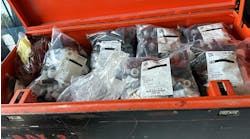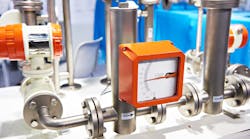Latest from Plumbing
Sponsored
A water flow meter is a device for calculating the amount of water flowing through a tube. There are plenty of water meter technologies available in the market that will suit the budgetary terms, water measurement applications, and maintenance requirements of an industry.
And each of these meters has particular application advantages, overall cost-of-ownership, and a distinct operating principle. However, the problem is what type of water meter should one choose for their application?
There are four generally known water flow meter types: magnetic flow meters, vortex volumetric flow meters, mechanical water flow meters, and ultrasonic flow meters. Let’s take a quick look at each type in turn.
Magnetic Flow Meters
This type of water flow meter calculates the rate of a fluid flowing through a tube via a magnetic field, and thus, measuring the volumetric flow. Magnetic flow meters are based on Faraday's Law of Electromagnetic Induction.
In this principle, liquid creates a voltage when it passes through a magnetic field. The quicker the flow, the greater the voltage. Moreover, since the voltage generated is proportional to the movement of the water, the voltage signal is, for the most part, translated into the volumetric flow rate through electronics.
Because the magmeters display a midway accuracy, they're not suitable for custody transfer processes. Also, magnetic flow meters can't be leveraged to calculate pure water (i.e., de-ionized water) because there are no ions to gauge.
Ultrasonic Flow Meters
This type of water flow meter calculates the rate of fluid flowing through the tube via ultrasound to gauge the volumetric flow. In transit-time ultrasonic meters, an ultrasonic signal is sent towards the flowing fluid downstream.
Additionally, another ultrasonic signal is sent towards the flowing fluid upstream. Basically, the time for the ultrasonic signal to traverse downstream is contrasted or collated to the time for the ultrasonic signal to traverse upstream.
Through this differential time, the flowing fluid's velocity is measured. Then the flow meter gauges the volumetric flow rate in the tube through the fluid velocity. Moreover, the British thermal unit energy measurement can be obtained from the volumetric flow rate as well as the temp difference between the cold and hot legs.
Furthermore, clamp-on ultrasonic flow meters can calculate water from outside of the tube by sending signals of sound via the pipe walls. Therefore, ultrasonic flow meters are flexible and are suitable for water flow calculations in large pipelines.
Vortex Flow Meters
This type of water flow meter utilizes vortices shed from a sensor immersed in the flow. These vortices are swirls generated when a fluid flows through a blockage, for example, water flowing over a rock in a stream.
A sensor tab moves from side to side whenever a vortex flow through, generating a frequency output that's straightforwardly proportionate to the volumetric flow rate. On the other hand, multivariable vortex meters can, for the most part, calculate at least five process variables with a single process connection: volumetric flow rate, mass flow, density, pressure, and temperature.
Moreover, insertion vortex flow meters function on large pipes because they can be placed into the flow by hot tapping with a retractor.
Mechanical Flow Meters
This type of water flow meter is the most economical and common water flow meter type. It does flow measurement via a turbine rotation with a paddle wheel, propeller, or shunt design. Mechanical flow meters function by calculating the rate of water passing through the tube that makes the turbine or piston to spin.
The rotational speed of the blades is proportionate to the volumetric flow rate of the water. However, the drawback of this flow meter type is that it might clog up when the water contains huge particles or is dirty, leading to expensive maintenance costs. Also, mechanical meters don't function when there's low water flow.
Takeaway
Naturally, choosing the ideal water flow meter for your application depends upon the particulars of that application.
Some meters function well when calculating or gauging various things—but is it information you need to get the best performance out of your system? Individual manufacturers can supply a wealth of information, as well as installation details that can ensure optimum performance. By then, you won't have a problem choosing one for your application.
Sylvia Hopkins is a writer and a blogger who specializes in e-mail marketing campaigns and ghost blogging. She writes about flow measurement instrumentation, flow measurement application, and technology. When not working, Sylvia spends some quality time with her family and friends.


